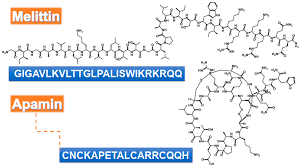
Bee Venom
The great Paracelsus once said:“He who despises poison knows not what lies hidden in the poison! For where there is poison, there is virtue.”

Bee venom is also known as apitoxin and is a transparent, odourless liquid mixture of proteins that bees use as a defence tool against predators.
One drop of bee venom consists of 88% of water and a small amount of venom.
Bee Venom Has Potential Health Benefits
For centuries, bee venom was used to assist with joint mobility suppleness and to boost the body’s natural immune system.
Bee venom contains several active molecules such as peptides and enzymes that have significant potential in treating inflammation.
Bee venom can enter into the human body orally (e.g., toothpaste), through manual injection or directly via bee stings.
Specialists agree that bee venom has significant anti-ageing properties.
There are many studies describing biological applications of bee venom and the potential use in alternative therapies.
Source: Wehbe R, Frangieh J, Rima M, El Obeid D, Sabatier JM, Fajloun Z. Bee Venom: Overview of Main Compounds and Bioactivities for Therapeutic Interests. Molecules. August 2019
Bee venom therapy (BVT) is one medicinal application of bee venom from honeybees into the human body for the treatment of some diseases, such as rheumatoid arthritis.
BVT has been used in alternative medicine for more than 5,000 years. The use of BVT in the medicinal field was first raised from the fact that beekeepers hardly suffer from rheumatism or joint problems.
More recent studies suggest that bee venom may also aid in the treatment of central nervous system diseases, such as Parkinson’s, Alzheimer’s, and amyotrophic lateral sclerosis.
Source: Reiter, Ch., (2007): Bienengift gegen Entzündungen – Ein Beitrag zur Schaffung wissenschaftlicher Grundlagen für Apitherapeutische Behandlungskonzepte. Endbericht
I want to know more (in german)
Source: Lee JA, Son MJ, Choi J, Yun KJ, Jun JH, Lee MS. Bee venom acupuncture for rheumatoid arthritis: a systematic review protocol. BMJ Open. 2014 Apr 23;4(4):e004602. doi: 10.1136/bmjopen-2013-004602. PMID: 24760349; PMCID: PMC4010843.
The use of Bee Venom has also shown promising benefits against different types of cancer as well as anti-viral activity, even against the challenging human immunodeficiency virus (HIV).
Source: Glass C.K., Saijo K., Winner B., Marchetto M.C., Gage F.H. Mechanisms Underlying Inflammation in Neurodegeneration. Cell. 2010;140:918–934. doi: 10.1016/j.cell.2010.02.016.



